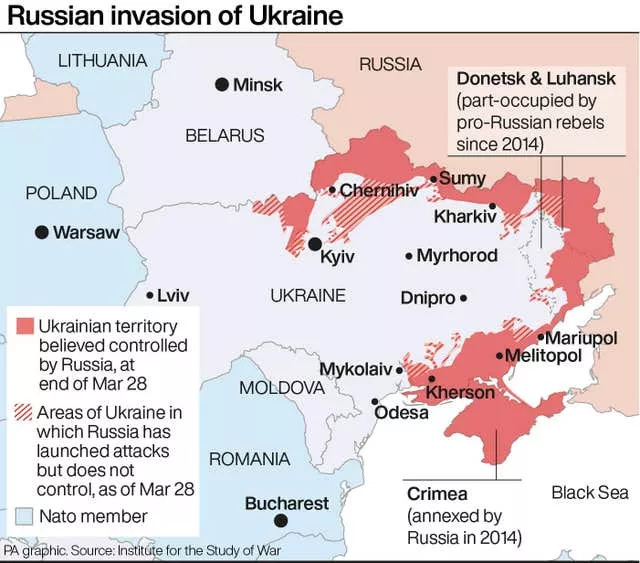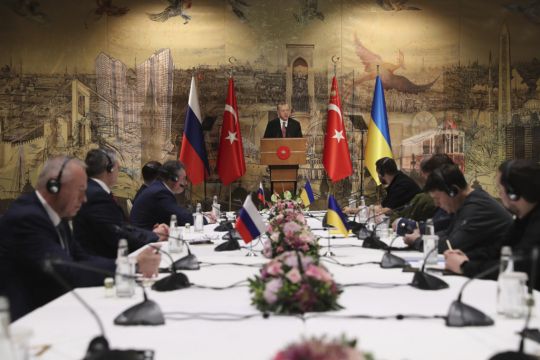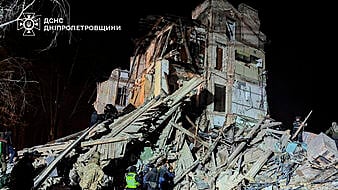Russia has announced it will significantly scale back military operations near Ukraine’s capital and a northern city, as the outlines of a possible deal to end the grinding war came into view at the latest round of talks.
Ukraine’s delegation at the conference, held in Istanbul, laid out a framework under which the country would declare itself neutral and its security would be guaranteed by an array of other nations.
Moscow’s public reaction was positive, and the negotiations are expected to resume on Wednesday, five weeks into what has devolved into a bloody war of attrition, with thousands dead and almost four million Ukrainians fleeing the country.
Amid the talks, Russian Deputy Defence Minister Alexander Fomin said Moscow has decided to “fundamentally… cut back military activity in the direction of Kyiv and Chernihiv” to “increase mutual trust and create conditions for further negotiations”.
He did not immediately spell out what that would mean in practical terms.
The announcement was met with scepticism from the US and other nations.
Ukraine President Volodymyr Zelensky said Russia cannot be trusted. Although the signals from the talks are “positive,” they ”can’t silence explosions of Russian shells,” he said.
Mr Zelensky said it was Ukrainian troops who forced Russia’s hand, adding that “we shouldn’t ease our guard” because the invading army still “has a great potential to continue attacks against our country”.

Ukraine will continue negotiations, he said, but officials do not trust the word of the country that continues “fighting to destroy us”.
While Moscow portrayed it as a goodwill gesture, its ground troops have become bogged down and taken heavy losses in their bid to seize Kyiv and other cities.
Last week and again on Tuesday, the Kremlin seemed to lower its war aims, saying its “main goal” now is gaining control of the mostly Russian-speaking Donbas region in eastern Ukraine.
US President Joe Biden, asked whether the Russian announcement was a sign of progress in the talks or an attempt by Moscow to buy time to continue its assault, said: “We’ll see. I don’t read anything into it until I see what their actions are.”
US Secretary of State Antony Blinken suggested Russian indications of a pullback could be an attempt by Moscow to “deceive people and deflect attention”.
Western officials say Moscow is reinforcing troops in the Donbas in a bid to encircle Ukraine’s forces. And Russia’s deadly siege in the south continues, with civilians trapped in the ruins of Mariupol and other bombarded cities.
“There is what Russia says and there is what Russia does, and we’re focused on the latter,” Mr Blinken said in Morocco. “And what Russia is doing is the continued brutalization of Ukraine.”

Even as negotiators gathered, Russian President Vladimir Putin’s forces blasted a gaping hole in a nine-story government administration building in a strike on the southern port city of Mykolaiv, killing at least 12 people, emergency authorities said. The search for more bodies in the rubble continued.
“It’s terrible. They waited for people to go to work” before striking the building, said regional governor Vitaliy Kim. “I overslept. I’m lucky.”
Pentagon spokesman John Kirby said the US has detected small numbers of Russian ground forces moving away from the Kyiv area, but it appeared to be a repositioning of forces, “not a real withdrawal”.
He said it was too soon to say how extensive the Russian movements may be or where the troops will be repositioned.
“It does not mean the threat to Kyiv is over,” Mr Kirby said. “They can still inflict massive brutality on the country, including on Kyiv.”
He said Russian airstrikes against Kyiv continued.
The meeting in Istanbul was the first time negotiators from Russia and Ukraine talked face-to-face in two weeks. Earlier talks were held in person in Belarus or by video.
Among other things, the Kremlin has demanded all along that Ukraine drop any hope of joining Nato.
Ukraine’s delegation offered a detailed framework for a peace deal under which a neutral Ukraine’s security would be guaranteed by a group of third countries, including the US, Britain, France, Turkey, China and Poland, in an arrangement similar to Nato’s “an attack on one is an attack on all” principle.
Ukraine said it would also be willing to hold talks over a 15-year period on the future of the Crimean Peninsula, seized by Russia in 2014.
Vladimir Medinsky, head of the Russian delegation, said on Russian TV that the Ukrainian proposals are a “step to meet us halfway, a clearly positive fact”.
He cautioned that the parties are still far from reaching an agreement, but said: “We know now how to move further toward compromise. We aren’t just marking time in talks.”







